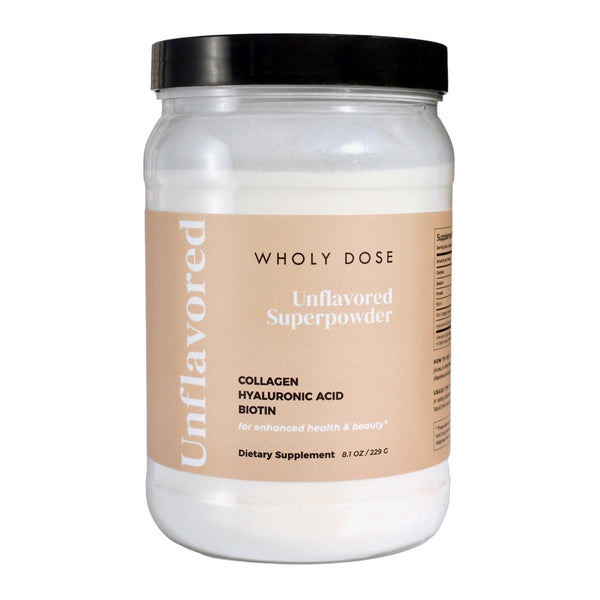
Hair Loss Symptoms and Causes
Hair loss, also known as alopecia, can be temporary or permanent – affecting your scalp or your entire body. Hair loss causes include heredity, hormonal changes, medical conditions, or aging. While anyone can suffer from hair loss or balding on their head, it is more common in men than women.
Excessive hair loss from your scalp is typically referred to as baldness. The most common type of baldness is hereditary hair loss that comes with aging.
Some people prefer to let their hair continue to shed, thin out, or result in balding – letting their hair loss remain untreated or hidden, while others seek treatment to restore hair regrowth and prevent further hair loss.
When pursuing a hair loss treatment, be sure to consult a doctor about the cause of your hair loss and treatment options. Or, add a hair loss vitamin supplement like collagen to assist your body’s natural ability to regrow hair.
Hair Loss Symptoms
Depending on what is causing your hair loss, hair loss can appear in many different ways – starting suddenly or gradually, and affecting your scalp or entire body. Signs and symptoms of hair loss may include:
– Gradual thinning on head: This is the most common type of balding or hair loss caused by age. Women typically experience hair loss across the head, with a more common hair loss pattern at hairline in older women (also known as frontal fibrosing alopecia). For men, hair loss begins at the hairline on the forehead, as hair starts to fade.
– Patchy bald spots: In some cases, individuals can lose hair in patchy or circular bald spots on their head, beard, or eyebrows. Skin may become itchy or painful before the hair falls out.
– Loosening of hair (hair shedding): Those who have sustained a physical shock, emotional shock, or excessive stress can suffer from hair shedding or loosening. In this case, handfuls of hair may come out when washing hair in the shower, combing, or gently tugging on hair. This kind of hair loss results in overall hair thinning, however it is temporary.
– Diet deficiency: Deficiencies in your diet can result in hair loss such as not getting enough protein, vitamin D, omega-3s, and other essential fatty acids. Making sure you’re getting a complete diet with complete proteins may help aid your hair loss or shedding. Adding a supplement that contains vitamins your body may be lacking, and other key nutrients that it cannot create such as biotin, can also result in hair regrowth.
– Full-body hair loss: Certain conditions and medical treatments, like treating cancer with chemotherapy, can result in the loss of hair across the body. In these cases, hair usually grows back.
– Scaling scalp or patches: This can be a sign of ringworm and can result in broken hair, redness, swelling, or oozing of the scalp.
When To See A Doctor
If you are worried about persistent hair loss and want to pursue medical treatment, you should consult a doctor. For women who suffer from a receding hairline, you can talk to your doctor about treatment or implementing a hair growth supplement to avoid permanent baldness.
Also talk to a doctor if you notice patchy, sudden, or greater than usual hair loss when combing or washing your hair. In some cases, this can signal an underlying medical condition that may require treatment.
Hair Loss Causes
It is normal for individuals to lose 50 to 100 strands of hair per day, but this is usually not noticeable because new hair is regrowing at the same time. Hair loss, however, is when new hair does not grow in as normal hair loss occurs or when you lose more than 150 strands of hair per day.
Causes of hair loss can include one or more of the following:
– Genetics or family history: This is the most common cause of hair loss that occurs with aging or genetics. This is also known as androgenic alopecia, male-pattern baldness, or female-pattern baldness. It occurs gradually and in common patterns such as a receding hairline, bald spots for men, or thinning hair along the hairline and scalp for women.
– Medical conditions or hormonal changes: Many conditions can cause temporary or permanent hair loss, including hormonal changes from thyroid problems, autoimmune disorders, pregnancy, childbirth, or menopause. These medical conditions include alopecia areata (an immune system related condition that causes patchy hair loss), scalp infections like ringworm or lice, or trichotillomania (a hair-pulling disorder).
– Medications: In some cases, hair loss can be a side effect of certain drugs such as those used to regulate hormones, common birth controls, and other treatments for cancer, arthritis, depression, heart conditions, gout, or high blood pressure.
– Radiation therapy: In this case, hair may not grow back or grow in the same as it was before.
– Stress: Stress or sustained stressful events can cause a general thinning of hair for months at a time following a physical or emotional shock. This hair loss is temporary but should be treated with supplements that help relieve stress and anxiety, like matcha.
– Hairstyles and hair treatments: Hair loss can be caused by hairstyles that tightly pull your hair or excessive hairstyling, which is known as traction alopecia. Other treatments such as hot hair tools, hair treatments, or permanent dies can also cause temporary or permanent hair loss.
Risk Factors For Hair Loss
Factors that increase the risk of hair loss include:
– Family history of balding (genetics and hereditary)
– Significant or sudden weight loss (for example, when you lose weight from a ketogenic diet)
– Age
– Stress and anxiety
– Certain medical conditions (such as lupus or diabetes)
– Poor nutrition or not getting complete protein from your diet
FIGHT HAIR LOSS WITH HAIR GROWTH SUPPLEMENTS
FOR HEALTHY, STRONGER GROWING HAIR
Hair Loss Prevention
In most cases, baldness is caused by genetics (such as female-pattern baldness or male-pattern baldness) and is harder to prevent.
For preventable types of hair loss, try these tips to help prevent hair loss:
– Proper care: Be gentle and avoid tugging when combing, brushing, or washing your hair. Use a wide-toothed comb to prevent pulling out hair, avoiding harsh treatments such as hot rollers, curling irons, hot-oil treatments, and permanent dies. Also limit harsh hairstyles, bands, barrettes, or braids that pull your hair.
– Protect your hair: Maintain a healthy scalp by wearing a hat when you're in the sun for a long time or treat your hair to a hair or scalp mask.
– Talk to your doctor: Medications and supplements such as those that contain collagen, biotin, or silica can help prevent hair loss and encourage hair regrowth, like Wholy Dose supplements.
– Stop smoking: Studies show an association between smoking and baldness, particularly in men. In these cases, eliminating smoking will reduce hair loss.
– Try a cooling cap: Consult your doctor about using a cooling cap if you are being treated for chemotherapy. This can reduce your risk of losing hair while undergoing chemo treatments.















